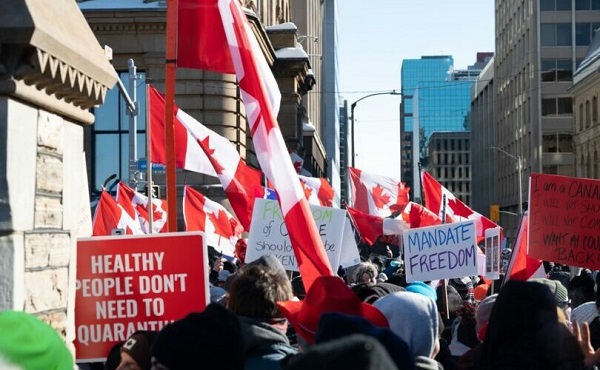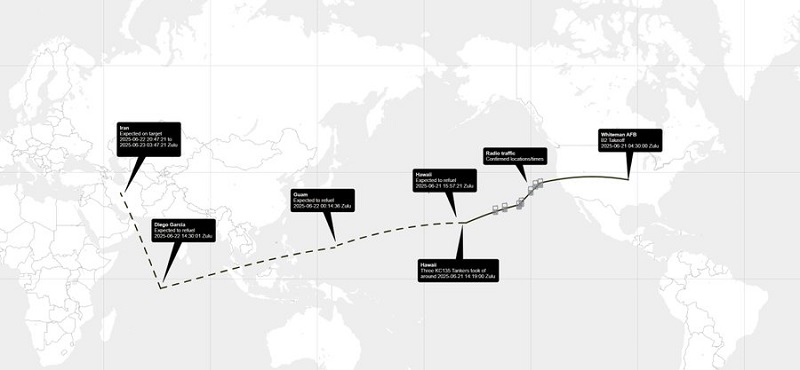COVID-19
Freedom Convoy leader Tamara Lich to face sentencing July 23

From LifeSiteNews
Freedom Convoy leader Tamara Lich is slated to be sentenced on July 23.
In a recent update by The Democracy Fund, the group noted that “Sentencing for Ms. Lich is scheduled for July 23rd and 24th before Justice Perkins-McVey in Ottawa.”
In April of this year, Lich and Chris Barber were found guilty of mischief for their roles as leaders of the 2022 protest and as social media influencers. The conviction came despite the non-violent nature of the popular movement.
TDF also noted that the full 108 page judgment of Justice Perkins-McVey’s ruling is now available online.
According to TDF, the “Court determined that both Ms. Lich and Mr. Barber were leaders of the Freedom Convoy 2022 movement and were involved in organizing and leading trucks and other vehicles from western Canada.”
“While there was no evidence that Ms. Lich owned a vehicle emitting fumes or honking, or that she blocked access to buildings, the Court noted her creation of the Freedom Convoy 2022 Facebook page, which gained a large following, and her involvement in setting up the GoFundMe and later GiveSendGo fundraising pages,” noted TDF.
As for Barber, his sentencing has been further delayed. The delay in his case follows an update he gave earlier this month in which he announced that the Crown wants to jail him for two years in addition to seizing the truck he used in the protest. As such, his legal team has asked for a stay of proceedings for the time being.
The Lich and Barber trial concluded in September of 2024, more than a year after it began. It was only originally scheduled to last 16 days.
Lich and Barber were initially arrested on February 17, 2022, meaning their legal battle has lasted longer than three years.
Despite the peaceful nature of the Freedom Convoy, then-Prime Minister Justin Trudeau and his Liberal government invoked the Emergencies Act to clear-out protesters, an action a federal judge has since said was “not justified.” During the clear-out, an elderly lady was trampled by a police horse and many who donated to the cause had their bank accounts frozen.
The actions taken by the Trudeau government were publicly supported by Mark Carney at the time, who won re-election on April 28 and is slated to form a minority government.
COVID-19
New Peer-Reviewed Study Affirms COVID Vaccines Reduce Fertility

Here’s what the numbers reveal, and what it could mean for humanity
What was once dismissed as a “conspiracy theory” now has hard data behind it.
A new peer-reviewed study out of the Czech Republic has uncovered a disturbing trend: in 2022, women vaccinated against COVID-19 had 33% FEWER successful conceptions per 1,000 women compared to those who were unvaccinated.
A “successful conception” means a pregnancy that led to a live birth nine months later.
The study wasn’t small. It analyzed data from 1.3 million women aged 18 to 39.
Here’s what the numbers reveal, and what it could mean for humanity.
First, let’s talk about the study.
It was published by Manniche and colleagues in the International Journal of Risk & Safety in Medicine, a legitimate, peer-reviewed journal respected for its focus on patient safety and pharmacovigilance.
The study was conducted from January 2021 to December 2023 and examined 1.3 million women aged 18–39. By the end of 2021, approximately 70% of them had received at least one COVID-19 vaccination, with 96% of the vaccinated cohort having received either the Pfizer or Moderna vaccine.
By 2022, a stark difference was clear.
The vaccinated cohort averaged around 4 successful conceptions per 1,000 women per month.
That’s a staggering 33% LESS than the 6 per 1,000 seen in the unvaccinated group.
This means that for every 2 vaccinated women who successfully conceived and delivered a baby, 3 unvaccinated women did the same.
In 2022, unvaccinated women were 1.5 times MORE likely to have a successful conception.
Again, that’s a conception that led to a live birth nine months later.
The authors did not jump to the conclusion that their study proved causation. They cited that other factors may have played a role, such as self-selection bias
However, the researchers noted that self-selection bias does not explain the timing and scale of the observed drop in fertility.
Moreover, birth rates in the Czech Republic dropped from 1.83 per 1,000 women in 2021 to 1.37 in 2024, adding further evidence that the COVID-19 vaccines may be contributing to the decline in fertility.
That downward trend, the researchers argue, supports the hypothesis that something beyond individual decision-making may be affecting conception rates.
As such, they argue that the study’s results warrant a closer and more thorough examination of the impact of mass vaccination.
If this study holds true, and vaccinated women are really much less likely to have successful conceptions, the implications for humanity are massive.
Millions of babies could be missing each year as a result of COVID vaccination, and recent data from Europe and beyond already point to a deeply disturbing trend.
NOTE: Europe experienced a sharper decline in births than usual from 2021 to 2023.
Live births fell from 4.09 million in 2021 to 3.67 million in 2023, marking a 10.3% decline in just two years.
The new Czech study adds to growing evidence that COVID vaccines may be contributing to a dramatic decline in fertility, just as many feared all along.
As Elon Musk warns, “If there are no humans, there’s no humanity.”
Whether the shots are the cause or not, the trend is real—and it’s accelerating.
It’s time to stop dismissing the signals and start investigating the cause.
Thanks for reading. I hope this report gave you real value. This is a critically important topic that deserves attention.
If you appreciate my work and want to help keep it going, consider becoming a paid subscriber.
99% of readers get this content for free. But just $5/month from the 1% keeps it flowing for everyone else.
If this work matters to you, this is the best way to support it.
Be the 1% who makes it possible.
Catch the rest of today’s biggest headlines at VigilantFox.com.
COVID-19
Ontario man launches new challenge against province’s latest attempt to ban free expression on roadside billboards

The Justice Centre for Constitutional Freedoms announces that Ontario resident George Katerberg has launched a legal challenge against the Ontario Ministry of Transportation for banning roadside billboards with social or political messages. Mr. Katerberg believes that the Ministry’s policies go too far and undermine the freedom of expression of all Ontarians.
This case goes back to March 2024, when Mr. Katerberg, a retired HVAC technician, rented a billboard on Highway 17 near Thessalon, Ontario, that featured images of public health officials and politicians alongside a message critical of their statements about vaccines.
After the Ministry rejected his proposed billboard several times on the grounds it promoted hatred, a constitutional challenge was launched with lawyers provided by the Justice Centre. Mr. Katerberg’s lawyers argued that the Ministry’s position was unreasonable, and that it did not balance Charter rights with the purposes of relevant legislation.
The Ministry later admitted that the sign did not violate hate speech guidelines and agreed to reconsider erecting the billboard.
However, in April 2025, the Ministry quietly amended its policy manual to restrict signs along “bush highways” to those only promoting goods, services, or authorized community events.
The new guidelines are sweeping and comprehensive, barring any messaging that the Ministry claims could “demean, denigrate, or disparage one or more identifiable persons, groups of persons, firms, organizations, industrial or commercial activities, professions, entities, products or services…”
Relying on this new policy, the Ministry once again denied Mr. Katerberg’s revised billboard.
Constitutional lawyer Chris Fleury explains, “By amending the Highway Corridor Management Manual to effectively prohibit signage that promotes political and social causes, the Ministry of Transportation has turned Mr. Katerberg’s fight to raise his sign into a fight on behalf of all Ontarians who wish to express support for a political or social cause.”
No date has yet been assigned for a hearing on this matter.
-

 COVID-192 days ago
COVID-192 days agoOntario man launches new challenge against province’s latest attempt to ban free expression on roadside billboards
-

 Alberta2 days ago
Alberta2 days agoAlberta Next Takes A Look At Alberta Provincial Police Force
-

 COVID-192 days ago
COVID-192 days agoNew Peer-Reviewed Study Affirms COVID Vaccines Reduce Fertility
-

 conflict2 days ago
conflict2 days agoFordow obliterated: Israeli report confirms nuclear site inoperable
-

 Business2 days ago
Business2 days agoFederal government should finally cut Trudeau-era red tape
-

 MAiD1 day ago
MAiD1 day agoCanada’s euthanasia regime is not health care, but a death machine for the unwanted
-

 Energy2 days ago
Energy2 days agoThis Canada Day, Celebrate Energy Renewal
-

 Alberta2 days ago
Alberta2 days agoCanadian Oil Sands Production Expected to Reach All-time Highs this Year Despite Lower Oil Prices


















